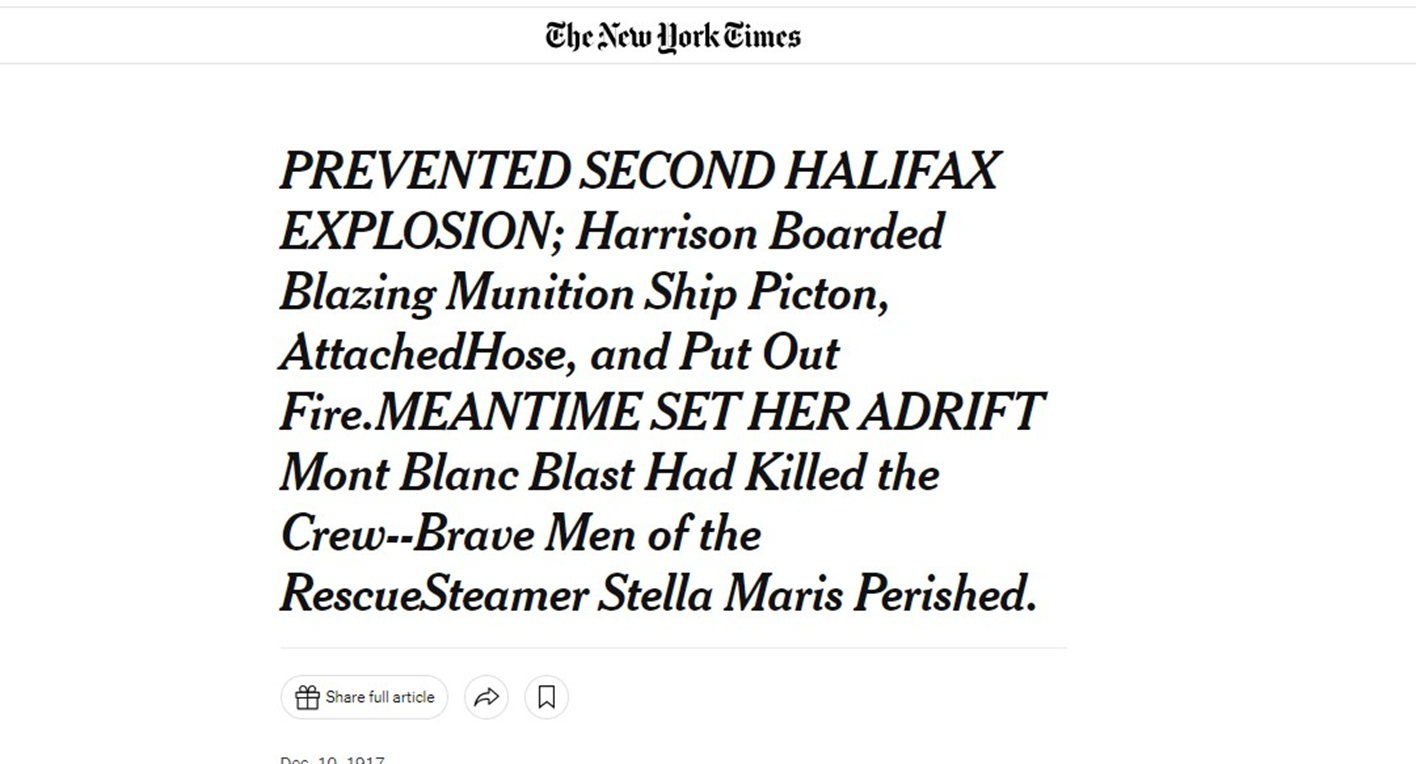I’m interested in the balance between humility, and recognizing and celebrating achievement.
Recently I’ve read some articles on an increasing
narcissism in society, and our general inability to productively and politely
manage disagreements. As I explored this theme, I discovered the article below
in which the author asserts that we need more humility in our society. I do agree. But are we sometimes too humble?
Are there times we fail to recognize and celebrate achievement?
https://www.psychologytoday.com/ca/blog/meaning-making/202008/how-to-become-more-humble
Learning About Saint John
Toastmasters First Club President
A few weeks ago, I learned about Les Harrison, the
first president of my Saint John Toastmasters club (#1479), which was founded
in 1954.
Lieutenant Harrison, was undeniably an absolute
hero, saving hundreds, and maybe thousands, of lives on December 6, 1917 during the Halifax Explosion. A New York Times headline from December 10,
1917 reads;
The disaster occurred 30 minutes after two ships had
a collision. The subsequent explosion killed 1,800 and injured 7,000 in a city
of 60,000 people. The 250-foot-long ship Mont Blanc, full of explosives on
route to support WW I allies, was launched 1,000 feet into the air. This was
the largest manmade explosion that had ever occurred to that time, before the nuclear
bombings in WW II. (https://en.wikipedia.org/wiki/Halifax_Explosion)
Lieutenant Les Harrison and his father Captain
James Harrison happened to be in Halifax Harbour when the massive explosion
occurred. Soon after the explosion, they boarded a second ship full of
explosives and extinguished an onboard fire. Their actions saved many lives.
I learned of their heroism, and humility, because I
received an email from Les Harrison’s grandson, Ian Bliss. Ian lives in Ottawa,
and is President and CEO of Northern Shield Resources, a company traded on the
TSX exchange. He wrote that his family was downsizing, and he possessed a
silver tray that had been presented to his grandfather Les to commemorate his
term as the first president of the Saint John Toastmasters club on its founding
in 1954. The tray is now in the club’s possession.
Founding Members
Our club houses a list of the charter members, the founding members of the club. The name Les Harrison was not familiar to me. Several other names were familiar to me, such as Philip Oland, who led Moosehead Breweries through a tremendous period of growth and expansion (Oland was born in Halifax in 1910 and his family moved to Saint John after the explosion in 1917). During his career, Oland received the Order of Canada, and the Canadian Forces Decoration award.
Tom Simms oversaw a similar growth period in the
paint brush factory his father started (https://www.simms.ca/)
George Crosby started Crosby Molasses and developed
a company that sells product across Canada and the United States (https://www.crosbys.com/)
As I was unaware of Lt. Harrison, I asked Ian about
his grandfather’s career. He wrote that Les Harrison and his dad were ship
captains, guiding sail and steam ships from Saint John, Halifax, and Portland
across the Atlantic. More details about
the ship they boarded, The Picton, and the event are contained here
https://en.wikipedia.org/wiki/SS_Picton
Ian also wrote that Les, in 1917, was “one of a
relatively few number of people that had a working automobile so (they) spent
days shuttling injured to hospital.” Of note, on the day after the explosion,
Halifax endured a major blizzard, complicating rescue activities.
For More Information - The
Legion magazine
The publication The Legion Magazine has published articles
on Canadian Military history and veteran affairs since 1929. Below is a link to
a comprehensive review they published on the Halifax explosion and in which
they write of the heroics of the Harrisons in boarding The Picton and
extinguishing the onboard fire.
https://legionmagazine.com/features/halifax-explosion/index.html
From The Legion magazine;
“Capt. James W. Harrison, Marine
Supt. of Furness Withy Co.,
recognised the danger of the ballast exploding, and made his way to the ship
with help from his son, Lt Leslie Harrison. He commandeered the tug Weatherspoon and
ordered its captain take him to the Picton.”
“Picton’s survivors had been taken to hospital, but marine superintendent
Captain James Harrison headed for the ship, knowing 1,300 tonnes of munitions
were still in the hold and that fire was consuming the nearby sugar factory.
When he arrived aboard, Picton’s bow was metres away from a burning
pier and the bridge was on fire. He put out the flames and ordered tugs to pull
the ship away from shore.”
Conclusion
Undeniably, our society could benefit from more
humility and less self-regard. But I
also believe we could benefit from a greater culture of celebration of recognition
and achievement.
I was delighted to learn about the heroism of
Lieutenant Les Harrison, and his father Captain James Harrison. Such heroism
should be recognized and celebrated.





